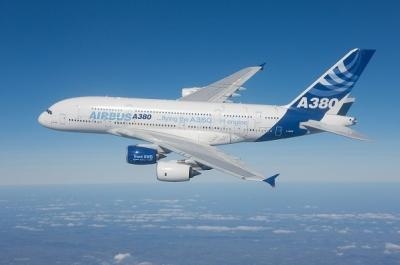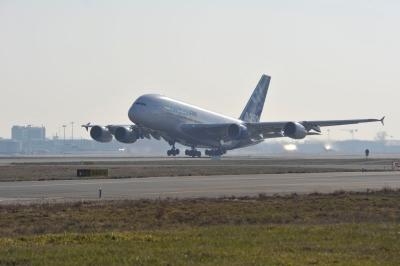Tue, Feb 21, 2012
Engine Flight-Test Campaign Underway One Year Ahead Of
Airplane’s First Flight
The A350 XWB’s new engine – the Rolls-Royce Trent
XWB – has successfully made its maiden flight aboard
Airbus’ dedicated A380 “Flying-Test-Bed”
aircraft. The aircraft took off from Airbus facilities in Toulouse
and performed a flight of more than five hours during which the
engine covered a wide range of power settings at altitudes up to
43,000ft. The aircraft handling qualities were evaluated from low
speeds to Mach 0.9. Rolls-Royce says the engine not only operated
flawlessly, but also demonstrated its new-generation fuel
efficiency and low noise.

The Trent XWB development engine, specially fitted with test
sensors to measure hundreds of parameters, was mounted on the
A380’s inner left engine pylon, replacing one of the
aircraft’s Trent 900 engines. The crew on board this first
flight were: Airbus Experimental test pilots Terry Lutz and Frank
Chapman; Experimental Test Flight Engineer Pascal Verneau; and
Flight Test Engineers Emanuele Costanzo and Tuan Do.
“The A350 XWB’s engine performed excellently during
its first flight-test, just as we expected,” said Charles
Champion, Executive Vice President of Engineering at Airbus.
“This is a promising start to the Trent XWB’s
flight-test program which will ensure a thorough real-life testing
of the engine, nacelle and its systems.” He adds: “This
will allow for a high level of powerplant integration, maturity and
reliability to be achieved by the time it flies on the first A350
XWB aircraft.”

Commencing around one year prior to the A350 XWB’s first
flight, this engine flight-test program is scheduled to accumulate
around 175 flight hours – some three times more airborne
flying hours than on previous programs. This will be accomplished
over a seven month period and will include hot weather as well as
icing condition testing campaigns. It will also test the advanced
nacelle and thrust reverser system provided by Goodrich.
The overall objective of these flight-tests is the early and
systematic validation of all performance aspects of the engine and
also the associated systems. In turn, this will contribute to
significantly ‘de-risking’ the A350 XWB’s
development well ahead of entry-into-service. The first results of
this flight-test campaign are expected this summer. (Photos
provided by Airbus)
More News
From 2021: The Inside Skinny On What Being An ANN Oshkosh Stringer Is All About By ANN Senior Stringer Extraordinare, Gene Yarbrough The annual gathering at Oshkosh is a right of p>[...]
Video Showed That During The Takeoff, The Nose Baggage Door Was Open On May 10, 2025, about 0935 eastern daylight time, a Piper PA-32RT-300, N30689, was destroyed when it was invol>[...]
Get The Latest in Aviation News NOW on Instagram Are you on Instagram yet? It's been around for a few years, quietly picking up traction mostly thanks to everybody's new obsession >[...]
"I think what is key, we have offered a bonus to air traffic controllers who are eligible to retire. We are going to pay them a 20% bonus on their salary to stay longer. Don't reti>[...]
Aero Linx: Pilot Briefing The gathering, translation, interpretation, and summarization of weather and aeronautical information into a form usable by the pilot or flight supervisor>[...]
 Oshkosh Memories: An Aero-News Stringer Perspective
Oshkosh Memories: An Aero-News Stringer Perspective NTSB Prelim: Piper PA32RT
NTSB Prelim: Piper PA32RT ANN FAQ: Follow Us On Instagram!
ANN FAQ: Follow Us On Instagram! Aero-News: Quote of the Day (05.28.25)
Aero-News: Quote of the Day (05.28.25) ANN's Daily Aero-Term (05.28.25): Pilot Briefing
ANN's Daily Aero-Term (05.28.25): Pilot Briefing




